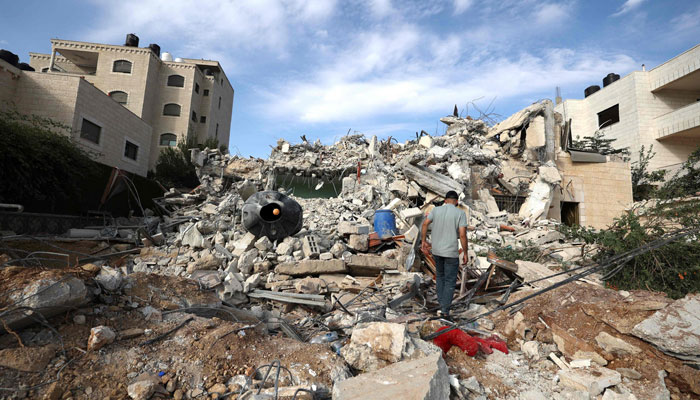Zionism’s dance of destruction
Broader message here is clear: rules of international law are flexible, especially when US and Israel are involved
In an already volatile Middle East, US President Donald Trump’s recent social media posts have added fuel to an already blazing fire. On Tuesday, Trump escalated tensions with Iran’s Supreme Leader, Ayatollah Ali Khamenei, posting ominous messages about the leader’s whereabouts and hinting at potential military action. These remarks not only signal a dangerous increase in hostile rhetoric but also intensify the already fraught debate surrounding the American role in the ongoing conflict. Trump’s comments, which seemed to straddle the line between threat and diplomacy, fuel the growing unease about US involvement in the Middle East. His follow-up post simply read: “Unconditional surrender!” What are we to make of these contradictory statements? Are they part of a high-stakes negotiation strategy or a dangerous incitement to escalate military conflict? Such ambiguity is dangerous in any context, but especially so in the delicate terrain of Middle Eastern geopolitics, where longstanding tensions already run deep. Trump’s statements raise critical questions: Could the US be pulled into the conflict more directly? Is Washington inching closer to actively being part of Israel’s bombing campaign against Iran?
The previous Biden administration, despite its assertions of non-involvement, had tacitly supported Israel’s actions in Gaza. And now there are reports of the current administration deploying additional fighter aircraft to the region. Meanwhile, Iran’s rhetoric remains defiant, Khamenei making it clear that any American involvement in the conflict would have “irreparable consequences”. Many seem to forget that it is Iran here that is the victim of Israeli aggression. And Iran has every right to self-defence.
It is not just Trump’s tone that is alarming, but also the international response. As Israel’s aerial strikes continue to target Iran’s nuclear facilities, military sites and civilians, the world watches with a disturbing sense of indifference. This back-and-forth between rhetoric and military posturing is also a reflection of the sheer hypocrisy and double standards of Western powers – as seen in the G7 meet. Israel, a nuclear-armed state with a well-documented history of human rights violations, is often portrayed as a victim in need of defence. Iran, meanwhile, is demonised as a rogue state that must be contained at all costs. This binary view, heavily promoted by the USand its allies, disregards the complexities of the region. And it is especially difficult to ignore the hypocrisy of Western leaders as the current conflict unfolds against the backdrop of years of atrocities committed by Israel in Gaza. For over a year and a half, Israel has been carrying out a brutal military campaign in Gaza, resulting in the deaths of tens of thousands, including women, children, and journalists. And now Israel seems to be salivating at the chance to do all this in Iran. The fact is that Israel’s actions – no matter how extreme – are shielded by the diplomatic and military support of the US. The broader message here is clear: the rules of international law are flexible, especially when the US and Israel are involved. But the US still has a choice – especially given the rathe topsy-turvy nature of its current politics. Will it continue to turn a blind eye to Israel’s aggression and be an accomplice? Or will it finally acknowledge the urgent need to put an end to Israeli impunity before the whole world goes up in flames?
-
 Margot Robbie Delivers Sweet Message Ahead Of Valentine's Day
Margot Robbie Delivers Sweet Message Ahead Of Valentine's Day -
 How AI Boyfriends Are Winning Hearts In China: Details Might Surprise You
How AI Boyfriends Are Winning Hearts In China: Details Might Surprise You -
 Blake Lively Mocked Over 'dragons' After Latest Court Appearance
Blake Lively Mocked Over 'dragons' After Latest Court Appearance -
 Gmail For Android Now Lets Users Create Labels On Mobile
Gmail For Android Now Lets Users Create Labels On Mobile -
 Emma Slater Reveals Final Moments With James Van Der Beek Before His Death
Emma Slater Reveals Final Moments With James Van Der Beek Before His Death -
 Princess Kate Makes Surprise Visit To Support Mental Health Initiative
Princess Kate Makes Surprise Visit To Support Mental Health Initiative -
 Reese Witherspoon Sparks Nostalgia With 'Green Sisters' Tribute To Jennifer Aniston
Reese Witherspoon Sparks Nostalgia With 'Green Sisters' Tribute To Jennifer Aniston -
 Royal Family Faces Fresh Crisis While Andrew's Controversy Refuses To Die
Royal Family Faces Fresh Crisis While Andrew's Controversy Refuses To Die -
 Travis Kelce’s Mom Talks About Taylor Swift’s Wedding Dance Song And Whether She’s Signed An NDA
Travis Kelce’s Mom Talks About Taylor Swift’s Wedding Dance Song And Whether She’s Signed An NDA -
 James Van Der Beek's Final Days 'hard To Watch' For Loved Ones
James Van Der Beek's Final Days 'hard To Watch' For Loved Ones -
 Lewis Hamilton Ditched Question About Kim Kardashian?
Lewis Hamilton Ditched Question About Kim Kardashian? -
 Will Smith, Jada Pinkett's Marriage Crumbling Under Harassment Lawsuit: Deets
Will Smith, Jada Pinkett's Marriage Crumbling Under Harassment Lawsuit: Deets -
 'Fake' Sexual Assault Report Lands Kentucky Teen In Court
'Fake' Sexual Assault Report Lands Kentucky Teen In Court -
 'Vikings' Star Shares James Van Der Beek's Birthday Video After His Death
'Vikings' Star Shares James Van Der Beek's Birthday Video After His Death -
 Jennifer Aniston Receives Public Love Note From Jim Curtis On 57th Birthday
Jennifer Aniston Receives Public Love Note From Jim Curtis On 57th Birthday -
 Microsoft AI Chief Says AI Will Replace Most White-collar Jobs Within 18 Months
Microsoft AI Chief Says AI Will Replace Most White-collar Jobs Within 18 Months




